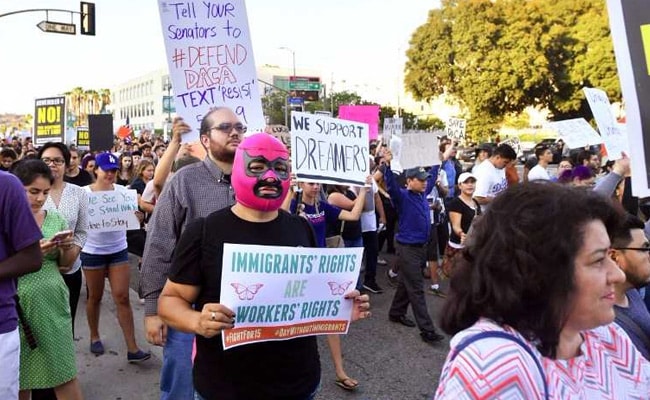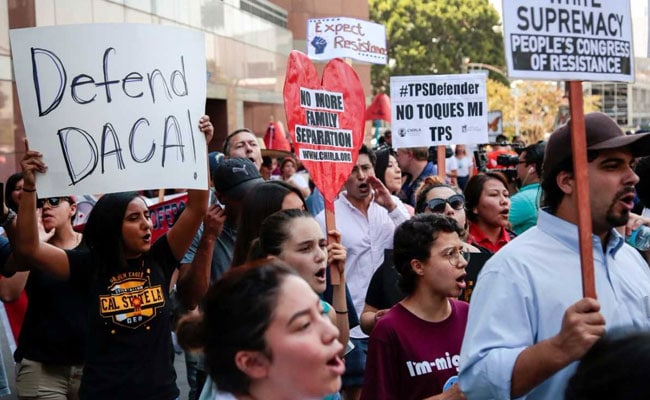
Protesters hold illuminated signs at a rally for Deferred Action for Childhood Arrivals (DACA)
In less than two months, my legal protections under the Deferred Action for Childhood Arrivals program will expire. My employer will have to let me go; I won't have a way to pay my rent; my family and friends will be inconsolable, knowing that I can be deported at any time. They're the ones whose lives will be disrupted, alongside mine, if I'm deported to a country I barely remember. After 22 years of living the United States, my future -- and the futures of about 800,000 young Americans like me -- is in total limbo.
Two months. A few weeks. Without congressional action to protect "dreamers" like me, that's all the time I can be sure I'll have left in the country I have called home for nearly all my life. I'm scared about a future without the family, friends and memories I have built over decades of love for and loyalty to a country whose government seems not to want to love me back.
It didn't have to be this way.
In September, President Donald Trump's administration announced an end to the Obama administration's DACA program and gave Congress six months to act and pass a legislative solution that would permanently shield dreamers from deportation. On Monday we reached that deadline, and in what has become a familiar, gut-wrenching reality for dreamers, Trump and Congress have failed to rise to the occasion.
When he ended DACA, Trump vowed to "resolve the DACA issue with heart and compassion." When the congressional fight over DACA heated up this year, the president said he wanted Congress to sign a "bill of love" that would fix our status for good. He's done neither, and so far, leaders in Congress have been all talk and no action.
 They've done nothing even though in January, a CBS News poll found that 87 percent of Americans stand with us and want dreamers to be able to stay. To say that we dreamers are disappointed in our elected representatives would be an understatement. We're gutted. We need them to stand with us, too. I'm only one of millions of immigrants who believe in this country, but I want the president and members of Congress to understand exactly why.
They've done nothing even though in January, a CBS News poll found that 87 percent of Americans stand with us and want dreamers to be able to stay. To say that we dreamers are disappointed in our elected representatives would be an understatement. We're gutted. We need them to stand with us, too. I'm only one of millions of immigrants who believe in this country, but I want the president and members of Congress to understand exactly why.
I grew up an American. I went to school in San Antonio, Texas. I was a Girl Scout. I volunteered in my community, helping to feed the homeless and raising money to help fund the bone marrow transplant of a boy I'd never met. I worked the cash register at my local grocery store and spent years fine-tuning my square-dancing skills, a testament to my Texas roots. This is my home, and even though I'm devastated at the prospect of being evicted from the only country I know, I realize that I'm fortunate. There are tens, maybe hundreds of thousands of dreamers who weren't eligible for DACA under the Obama administration's rules because they were either too young or too old to apply. They, too, are left behind by this court decision: Young people like Rosa Maria Hernandez, a 10-year-old with cerebral palsy who came to the U.S. as a baby and was too young to apply. Customs and Border Patrol agents stopped her ambulance at an immigration checkpoint while it was carrying her to emergency surgery. Dreamers like Jorge Garcia of Lincoln Park, Michigan, married to a U.S. citizen and the father of two U.S. citizen children, who came here as a 10-year-old. He was deported in January -- three decades later.
 Last week, the Supreme Court provided a glimmer of hope by declining to immediately rule on a lower federal court's ruling, in January, that halted the Trump administration's decision to wind down DACA on the basis that the decision was legally "flawed." It's just a temporary reprieve. The court's decision means that current DACA beneficiaries will be able to apply to renew our work authorizations and will be, for the moment, protected from immediate deportation.But we know this ruling could be overturned, or that the administration could try to terminate DACA by executive order as a way around the courts. Remember the Trump administration's travel ban? Several versions were blocked by courts. A later version wasn't.
Last week, the Supreme Court provided a glimmer of hope by declining to immediately rule on a lower federal court's ruling, in January, that halted the Trump administration's decision to wind down DACA on the basis that the decision was legally "flawed." It's just a temporary reprieve. The court's decision means that current DACA beneficiaries will be able to apply to renew our work authorizations and will be, for the moment, protected from immediate deportation.But we know this ruling could be overturned, or that the administration could try to terminate DACA by executive order as a way around the courts. Remember the Trump administration's travel ban? Several versions were blocked by courts. A later version wasn't.
What has been most misunderstood about this ruling is that for tens of thousands of DACA recipients whose protections expire in the next few months, many of us could still lose our work permits, driver's licenses, livelihoods and, most important, affirmative deportation protections. That's because the confusion created by the administration's DACA termination meant that many people like me were administratively unable to apply early enough for renewal of our status to ensure that there wouldn't be a gap in protection when our existing protection expired -- it typically takes four to five months for government review of a renewal application. The Supreme Court ruling came too late for individuals whose status expires in the next several months, including me.
The courts can't protect us forever. Only the president and Congress can. We need them to stand with us, and with the Americans who support common-sense legislation that lets us live, work and contribute to the only country most of us can remember, or have ever known. The United States has given us so much. If I'm deported, I'll be sad for myself. But I'll also be sad for my country, knowing that at just the point in my life when I'm finally able to give back for everything I've been given, I may not get the chance.
Dhalla, a Canadian-born "dreamer" who immigrated to Texas in 1996, is a communications associate at FWD.us.
(This story has not been edited by NDTV staff and is auto-generated from a syndicated feed.)
Two months. A few weeks. Without congressional action to protect "dreamers" like me, that's all the time I can be sure I'll have left in the country I have called home for nearly all my life. I'm scared about a future without the family, friends and memories I have built over decades of love for and loyalty to a country whose government seems not to want to love me back.
It didn't have to be this way.
In September, President Donald Trump's administration announced an end to the Obama administration's DACA program and gave Congress six months to act and pass a legislative solution that would permanently shield dreamers from deportation. On Monday we reached that deadline, and in what has become a familiar, gut-wrenching reality for dreamers, Trump and Congress have failed to rise to the occasion.
When he ended DACA, Trump vowed to "resolve the DACA issue with heart and compassion." When the congressional fight over DACA heated up this year, the president said he wanted Congress to sign a "bill of love" that would fix our status for good. He's done neither, and so far, leaders in Congress have been all talk and no action.

In September, President Donald Trump's administration announced an end to the Obama administration's DACA programme.
I grew up an American. I went to school in San Antonio, Texas. I was a Girl Scout. I volunteered in my community, helping to feed the homeless and raising money to help fund the bone marrow transplant of a boy I'd never met. I worked the cash register at my local grocery store and spent years fine-tuning my square-dancing skills, a testament to my Texas roots. This is my home, and even though I'm devastated at the prospect of being evicted from the only country I know, I realize that I'm fortunate. There are tens, maybe hundreds of thousands of dreamers who weren't eligible for DACA under the Obama administration's rules because they were either too young or too old to apply. They, too, are left behind by this court decision: Young people like Rosa Maria Hernandez, a 10-year-old with cerebral palsy who came to the U.S. as a baby and was too young to apply. Customs and Border Patrol agents stopped her ambulance at an immigration checkpoint while it was carrying her to emergency surgery. Dreamers like Jorge Garcia of Lincoln Park, Michigan, married to a U.S. citizen and the father of two U.S. citizen children, who came here as a 10-year-old. He was deported in January -- three decades later.

Donald Trump gave Congress six months to act and pass a legislative solution that would permanently shield dreamers from deportation (Reuters)
What has been most misunderstood about this ruling is that for tens of thousands of DACA recipients whose protections expire in the next few months, many of us could still lose our work permits, driver's licenses, livelihoods and, most important, affirmative deportation protections. That's because the confusion created by the administration's DACA termination meant that many people like me were administratively unable to apply early enough for renewal of our status to ensure that there wouldn't be a gap in protection when our existing protection expired -- it typically takes four to five months for government review of a renewal application. The Supreme Court ruling came too late for individuals whose status expires in the next several months, including me.
The courts can't protect us forever. Only the president and Congress can. We need them to stand with us, and with the Americans who support common-sense legislation that lets us live, work and contribute to the only country most of us can remember, or have ever known. The United States has given us so much. If I'm deported, I'll be sad for myself. But I'll also be sad for my country, knowing that at just the point in my life when I'm finally able to give back for everything I've been given, I may not get the chance.
Dhalla, a Canadian-born "dreamer" who immigrated to Texas in 1996, is a communications associate at FWD.us.
(This story has not been edited by NDTV staff and is auto-generated from a syndicated feed.)

